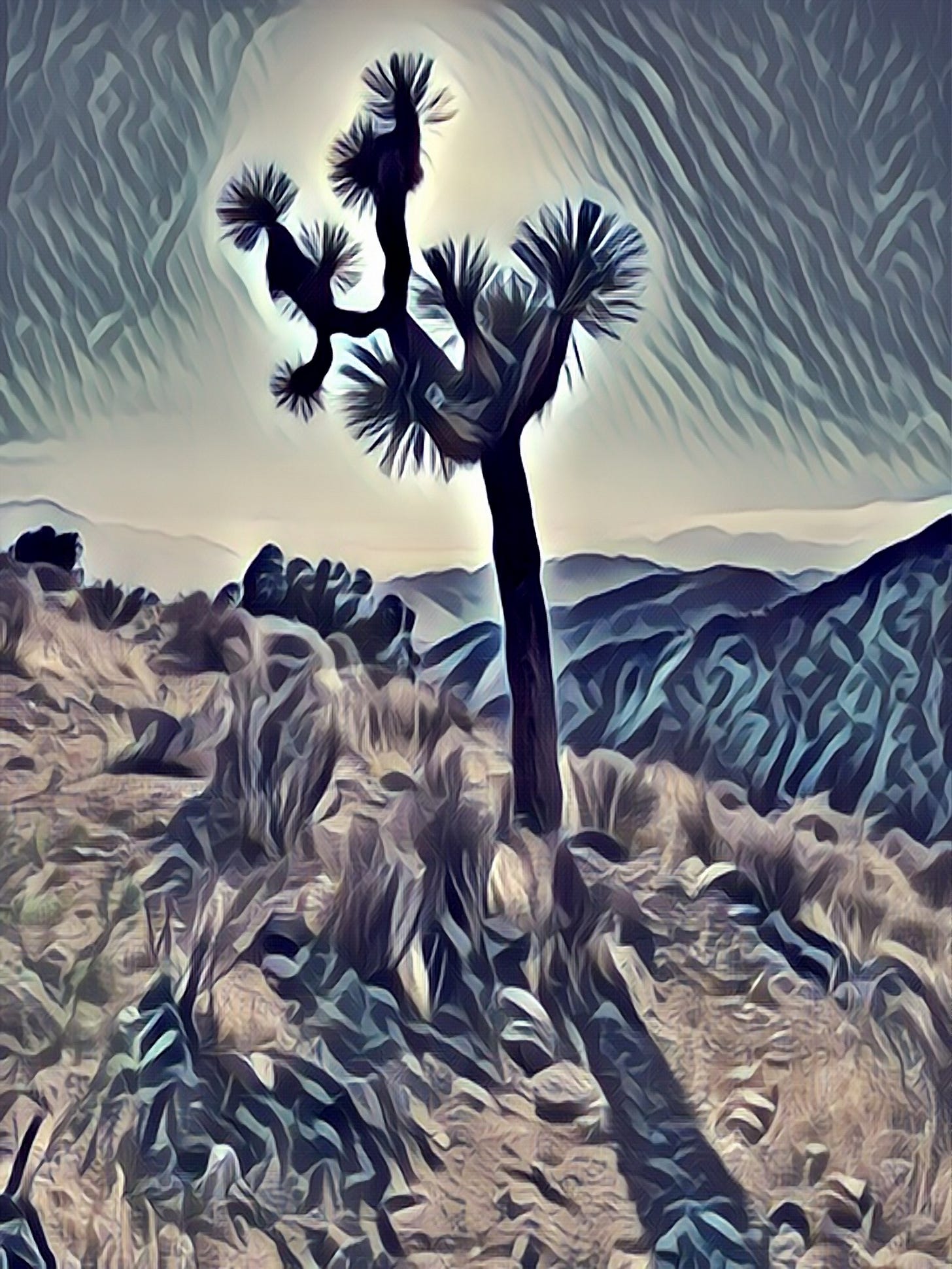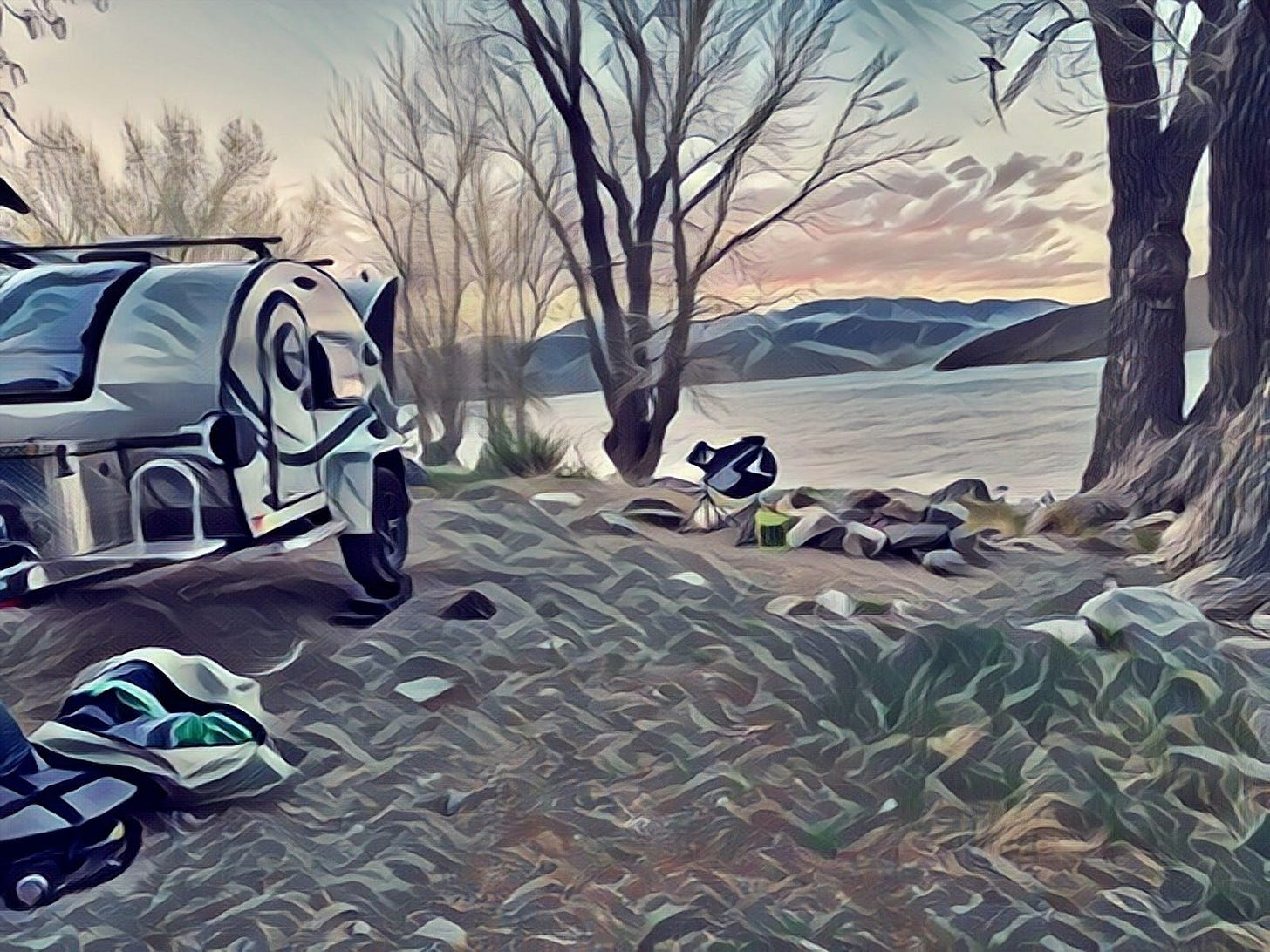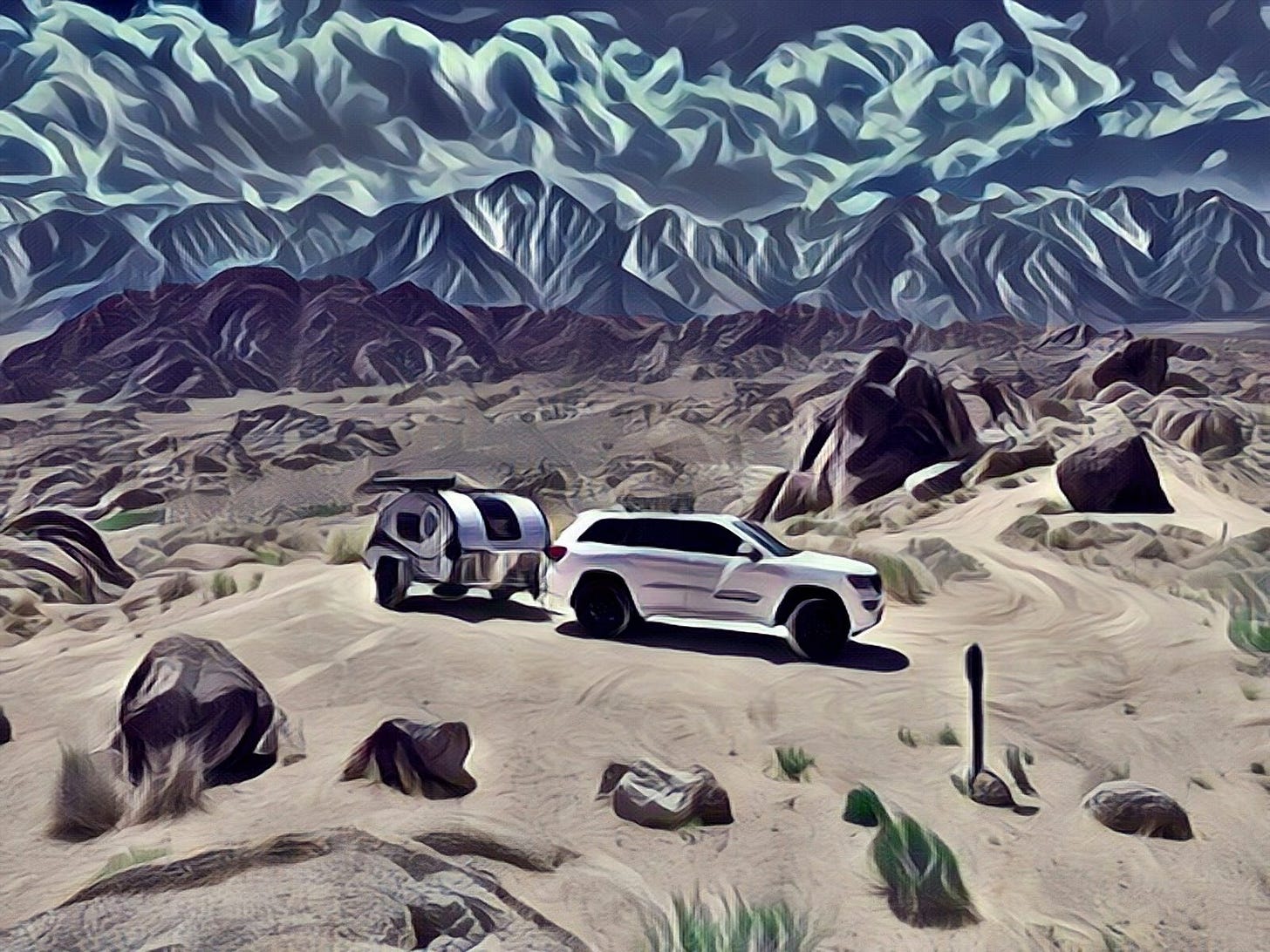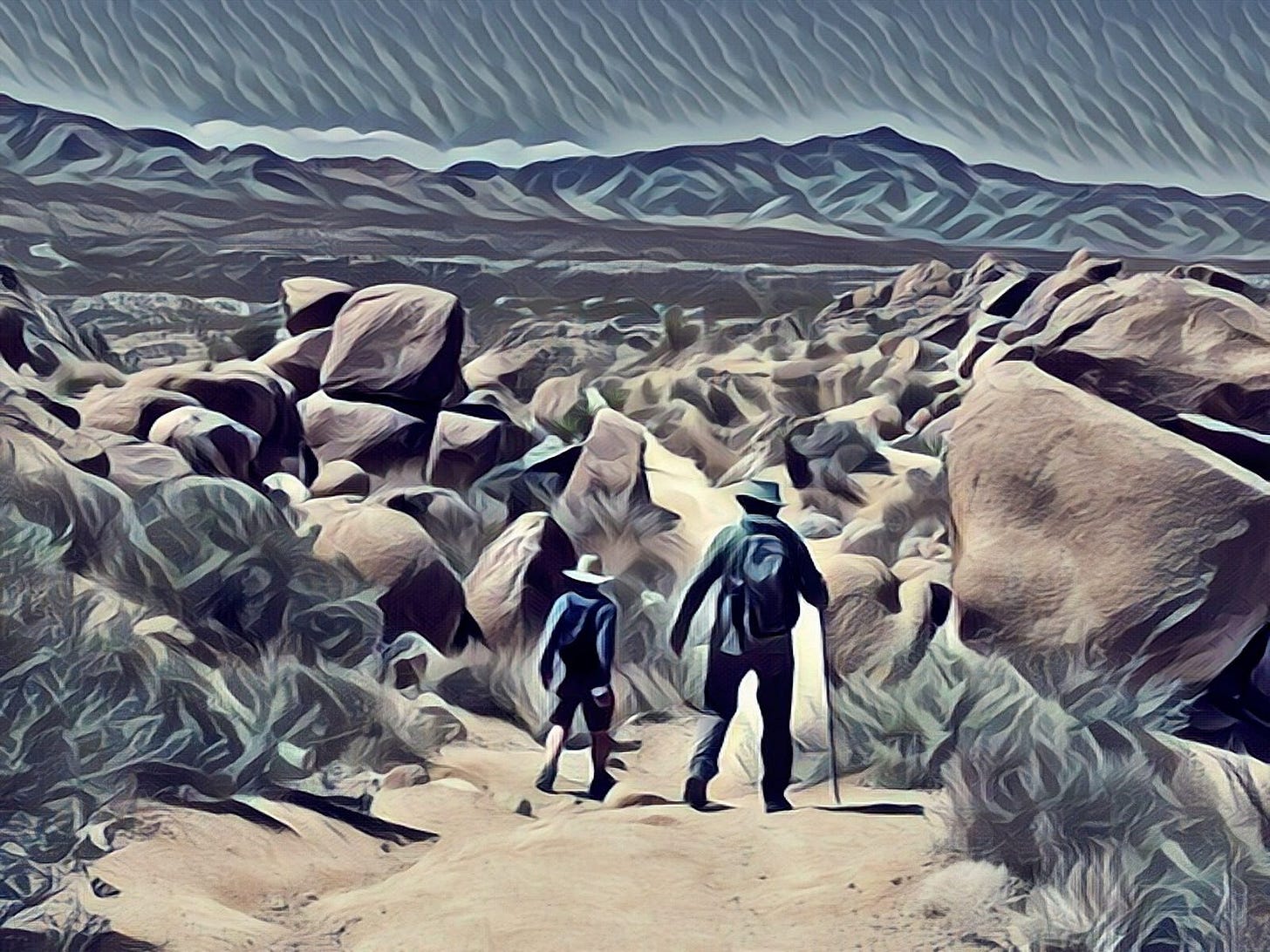The Road to Joshua Tree and the Voice Fear Tried to Silence
A reflective road trip through landscapes of silence, fear, and change
The Day's Last Light, Held by a Joshua Tree
When the Desert Spoke
Toes half-buried in warm desert sand, I watched the sun rise into a flawless morning. In the distance, the snowcapped peaks cut across the horizon — quiet reminders of the mountains I passed to get here.
The moment feels surreal: silence all around, sunlight on my face, the crispness of wide-open air.
I think to myself — this is how I want every day to begin.
Maybe there’s a way to carry some of this back home. But for now, it’s time to keep moving.
Of All Places, Why Here?
I’ve wanted to visit Joshua Tree for a while, so when my brother and his wife said they’d be there, I knew I had to make it happen. They’ve been on a mission to visit all 63 national parks and have gotten good at knowing how to make the most of each one — what’s worth seeing, what to skip, and how to experience it right. The timing lined up perfectly for us to meet out there.
The last time we were together was at our dad’s funeral. Naturally, we talked about him — his love for road trips and travel. Growing up, summer meant camping. We’d load up the yellow station wagon and hitch the camper, heading somewhere in the U.S. I have fond memories of those trips — friends, family, laughter — and that sense of adventure has always stuck with me.
Where the Silence Began
Since I’d be traveling solo, I wanted to give myself space to reflect, to write, and to finally turn toward something I’ve spent a long time skirting around: fear. Not the kind that jolts you in the moment, but the quiet, persistent kind — the kind that shapes decisions before you even realize it’s there. I’ve started spotting its fingerprints in different parts of my life.
And out here — on long, open roads and unfamiliar terrain — it felt like the right time to stop ignoring it. To get curious.
The desert has a way of stripping things down to their essence. And fear, in this landscape, doesn’t feel out of place. It feels like part of the story.
Fear can be like a dense fog over reality. The more unclear the moment, the murkier everything feels. The consequences always seem epic. Sometimes I downplay it, pretend it’s not there. Other times, it’s crippling — sweaty palms, second-guessing everything, losing trust in my own instincts.
I’ve spent most of my life trying to overcome this — deliberately putting myself in uncomfortable situations just to practice finding my way out. In my early twenties, I’d sign up to read the hymnal aloud at church, rehearsing for hours so I wouldn’t fall apart in front of people. On the surface, I looked composed. But inside, I was terrified.
I can trace it back to when I was thirteen. I grew up in the suburbs with older parents and a brother nine years my senior. My three other siblings had already moved out by then, and because of the age gaps, I never developed that classic sibling bond. In many ways, I was raised more like an only child.
Around that time, I was hanging out with a neighborhood kid, getting into trouble. We started shoplifting from the local Target — nothing big, but enough to feel the rush. Eventually, I got caught. My mom had to come pick me up, and I was mortified. My dad was still at work, and she told me to go to my room and wait. I knew what that meant. Back then, getting the belt wasn’t unheard of, and this felt like a serious offense.
When I heard him open the door, I clenched, bracing for it. But he just looked at me from the doorway and said, “Don’t do that again.” Then he turned around and closed the door. That was it. We never spoke of it again.
What stuck with me wasn’t relief — it was the silence. That silence grew into self-doubt. It became a whisper of second-guessing, overthinking, and avoiding conflict because I always expected the worst. The lesson wasn’t clarity or resolution. It was how to sit quietly with fear, never knowing what might come next.
I was deeply driven to succeed in business. I felt like I had something to prove, so I worked twice as hard to rise through the ranks. Maybe that old silence helped me focus — head down, no fanfare. Eventually, it paid off: I landed my dream role as president of operations at a moving and storage company.
These days, fear is both my companion and my captor.
For a while, life looked ideal — my wife stayed home with our two kids, and I was thriving at work. But underneath, we struggled to connect. My silent nature didn’t help. I carried a lot of shame about our failing marriage and stayed longer than I should have, worried about what others would think. Eventually, it unraveled. The kids moved across the country with their mom, and suddenly my success felt hollow. My priorities had shifted. I needed to be near them again.
Leaving that job was one of the hardest decisions I’ve ever made. But fear wasn’t the villain — it was the signal I had to listen to, not obey. After a lot of thought and planning, I left the role and joined a boutique marketing agency run by a friend. It allowed me to work remotely. Step one: complete.
Now, how do I actually get to Oregon?
I started small — committing to six months to a year. I pulled money from my retirement, calculated how long it would last, and left my things in Wisconsin in case I needed to return. The surprising part? It was easier than I expected. No dating. Not much drinking. A cheap place to stay. Suddenly, the “big leap” looked more like a series of manageable steps.
I also knew I needed community. I needed to be there for my kids. And that was the real lesson in all of it: big moves don’t always require big gestures. Sometimes, they just need a clear next step — and a little faith that the rest will follow. Sometimes luck is on your side. Maybe for a reason.
These days, fear is both my companion and my captor. He travels with me to keep me safe, and I love him for that. I wouldn’t have made it to 56 without his voice whispering: Be careful. Save your money. Take care of your body. Build something. Stay close to people who matter. Fear only becomes a problem when you let him take the wheel.
Looking Out Over Lake Tahoe
Setting It in Motion
It’s Friday morning, and I’m excited to hit the road — from Eugene, Oregon to Joshua Tree National Park. I’ve checked and double-checked everything. There’s enough food to last ten days. I reconfigured the teardrop trailer so one side’s for sleeping, the other for stretching. I packed a little firewood and threw in the kayak — just in case I come across a quiet mountain lake.
I even have a Google Doc with tabs for everything: meal plans, gear lists (broken down by kitchen, sleeping, and general camping), and points of interest along the way. My girlfriend teases me for being a little too organized. But I know myself — I overthink things. The checklist helps. It turns anxiety into something useful.
The first day was long stretches of winding road — through mountain passes and sweeping scenery. It gave me time to think. One question kept resurfacing: How does fear show up? In the small moments, like how I interact with others. And in the big ones — like walking away from a 23-year career.
Driving through the mountains felt like a metaphor for transition. Everything comes at you fast, and your choices have immediate consequences. My inner voice whispered: Be careful. One mistake, and you could go over the edge.
I reached Lake Tahoe by nightfall. The place I’d marked to stay was closed for the season, but as I drove around, I spotted another resort and decided to stop. The host at the front desk told me I had to book through the recreation.gov app — but warned that others had trouble finding availability.
So I drove across the street to check it out myself. The campground was barely half full, but when I logged into the app, every site showed as unavailable.
I paused and told myself: Talk to someone. Be curious. That’s not my instinct. Normally, I avoid strangers. But I pushed myself to ask a group of three campers — what looked like a father and two adult sons — if they’d had trouble reserving. The father nodded. “We got the last one,” he said, even though we were surrounded by empty sites. Something was clearly off with the system.
One of the sons, sipping a beer by the fire, gestured to the vacant site next to them. “Just go there,” he said. “We won’t say anything.” I laughed. “I’ll think about it,” I told him.
But instead of spending the night worrying about getting kicked out, I found another campground and reserved a site over the phone. I was set for the night.
It was a small decision, but it reminded me why I do this — why I chase these kinds of trips. They push me into situations where I have to trust myself.
One of my coping mechanisms is planning big adventures that force me to act. They look like travel, but they’re really about transformation. I’ve learned that if I commit to something big — a cross-country move, a solo road trip, a hymn reading in front of strangers — it pulls me out of my head and into the moment. I don’t get to overthink when I’m in motion.
Fear still shows up. It always does. Sometimes it tells me to play it safe, to stay quiet, to avoid eye contact or tough conversations. But when I follow through on a bold move — like leaving my job of 23 years or starting over in Oregon — I realize I’m not trying to run from fear. I’m learning how to carry it differently.
These adventures are me working on myself in real time. They shape my rhythm. I plan meticulously, sure — but the real growth comes in the unexpected moments, like choosing to talk to a stranger at a campsite. Every time I push past the old habit of silence, it feels like freedom. Like maybe I could belong anywhere, just by being a little braver than I was the day before.
That sense of freedom carried into the next morning, as I set out to circle Lake Tahoe and take in the landscape on my own terms. The views were breathtaking — steep forest roads, the lake stretching below, snow-capped mountains beyond.
Solo travel means every decision is mine. I passed a dirt road that called to me, but I hesitated — and regretted it. I promised myself: next time, choose faster. Choose in alignment with who I’m becoming. It’s not easy. The road moves fast, and life doesn’t wait. But this is my journey. I get to decide how to meet it.
My next stop was Crowley Lake Columns — a natural wonder where stone pillars rise 25 feet from the shoreline, like giant icicles frozen mid-melt. What made it even better was how hard it was to get there. The rough road and steep hike kept the crowds away. Out there, self-doubt went quiet. All I felt was wonder.
Nature's Cathedral at Crowley Lake
As I continued south, the Sierra Nevada range sharpened in the distance. Small towns appeared like invitations to slow down. One caught my eye with towering steel sculptures out front — quirky, rusted pieces that looked like they’d grown from the desert floor. I pulled over.
A full-size steel horse stood guard at the entrance. The shopkeeper, stocky and warm, greeted me as she set out open signs for the day. I was her first customer. We started talking — about her art, the shop, and the challenges of making a living in a remote town.
She rents U-Hauls to supplement her income, a practical move with the Marine base nearby. But it’s not easy. Sometimes the corporate office sends young Marines to pick up trailers from faraway locations. She shrugged — it doesn’t always make sense. I knew the system well, having spent years as a U-Haul president. Equipment logistics are tricky; trailers can’t just sit around waiting. Still, hearing her side reminded me how imperfect the balance is between efficiency and real-world need.
Fear wants us to keep moving, to stick to the plan. But growth often lives in the detours.
We connected. She reminded me of so many independent dealers I’d met — resilient, resourceful, and proud of the work they do. I bought a handmade concrete turtle before heading out.
Fear wants us to keep moving, to stick to the plan. But growth often lives in the detours. Now, when I see that turtle in my garden, I think of that stop—and smile.
Later that day, I found an incredible dispersed campsite tucked beside a calm mountain lake. The afternoon sun was unusually warm, perfect for a lazy paddle in the kayak. After so many hours on the road, it felt like the trip exhaled with me — a moment of stillness before the next stretch.
My Campsite, My Sanctuary. Quartz Lake
By sunrise, I was heading south again. A clear sky lit up the jagged snowcaps of the Sierra Nevadas running parallel to the highway. The green faded gradually. Trees thinned, the soil shifted. When did this become desert?
Nature imitates life: transitions aren’t abrupt. Mountains don’t just end — they give way through subtle shifts. Different plants, different temperatures, different colors. Then suddenly, you realize — you’ve arrived somewhere new.
My next destination had a curious name for California: the Alabama Hills. I’d heard rave reviews, but nothing prepared me for the surreal beauty.
Massive boulders rose from the desert floor like sleeping creatures. I drove slowly, kicking up dust on winding roads, trying to imagine what early pioneers must have felt stumbling onto this land. The rocks looked alive, frozen mid-motion. Strange shapes. Silent giants.
As I wandered, color revealed itself. Wildflowers and cactus bloomed in brilliant reds, yellows, and whites, scattered like paint across the otherwise muted palette.
It struck me: the desert isn’t empty. On the surface, it’s arid and harsh — but if you slow down, look closely, it’s alive with unexpected beauty. Maybe that’s the gift of wide open spaces: they challenge you to fill them with presence, with meaning, with your own vibrant life.
Open Space, Open Mind. Alabama Hills
I’m almost to Joshua Tree, where I’ll meet my brother and his wife. I wonder how this reunion will shift the dynamic. Will it transition as subtly as the land I’ve traveled through, or will it be jarring and sharp, like a sudden bend in the road? Either way, I feel more open. Less afraid. Ready to discover what’s next.
My last stop before meeting them is a campground in the San Bernardino State Forest. After a long day of heavy traffic, I arrive drained — frustrated, tired, mentally foggy.
As I pull into my site, a fellow camper approaches. He looks like a solo traveler too. “This is going to sound weird,” he says, “but do you have change for a hundred?”
Immediately, fear takes the wheel. I scoff, instinctively suspicious. A hundred-dollar bill? This guy must be trying to scam me. I brush him off without a second thought.
But the truth is — I did have the change. And this was a cash-only campground, just $15 a night. He wasn’t lying. He just needed help.
All trip, I’ve been working to quiet that fearful voice, to choose connection over retreat. But that night, I let my exhaustion do the talking.
By morning, he was gone. I stood by his empty site, staring quietly.
Once again, fear had taken something from me. Another moment. Another chance.
A Fitting Place to End and Begin
The final leg of my journey is a short drive to Joshua Tree. After five days solo, I’m curious how it will feel to reunite with family. I’ve been learning to trust myself more, to quiet fear, to build habits that help me stay present — to meet each moment honestly. This feels like the last step in letting go of an old voice I’ve carried for too long.
I arrive at Black Rock Campground, and about an hour later, my brother and his wife pull up. Their faces bring comfort, and I wrap them both in a hug. It’s been a while, but it feels effortless — like no time has passed.
We head into the park and spend the day exploring everything this strange and stunning place has to offer. When I first heard about Joshua Tree, it felt like a mystery — these trees that look like they belong to another world. Now, standing among them, I feel a million miles from my everyday life. And maybe that’s the point. Maybe I can reimagine my life, step outside the box I didn’t know I’d built.
I take in the surreal rock formations, the Cholla cactus glowing in the setting sun, the desert palms tucked into hidden canyons, and the lizards darting across the sand. This landscape reminds me: anything is possible. A perfect place to mark a transition.
My brother and me, hiking Joshua Tree
I ended my time in Joshua Tree at a sound bath called The Integratron. I arrived early and spoke with other visitors. Everyone was kind — especially a couple from Boston on a quick getaway from Palm Springs. The structure was built by George Van Tassel, an aeronautical engineer who claimed he received its design through telepathic transmissions from extraterrestrials. He blended elements of Moses’ Tabernacle, Nikola Tesla’s theories, and his own spiritual beliefs. Whatever its origin, the building is acoustically stunning. The sound of 22 quartz crystal bowls filled the room, vibrating through every part of me.
Lying there on the mat, I felt calm. Centered. Like I was finally able to ask myself: What voice do I want to listen to now?
I thought back to when I was 13 — after the Target incident with my dad. Afraid. Confused. Unsure how to speak up. I wonder what might have changed if we’d found clarity that day — if I had asked a question. If he had seen past my silence.
I can’t rewrite that moment. But I can choose differently now.
The voice I carried for so long — the one shaped by fear, silence, and self-doubt — isn’t mine anymore.
What if I let curiosity lead instead? What if I made space for wonder, not worry — for connection, not control?
I don’t know what’s in store. But I’m open.
And for now, that’s more than enough.
*Each image was transformed with Fotor to echo how the desert reshaped the way I saw things — inside and out.









